Elam Stoltzfus: Rediscovering the Ausbund (Part 4)
We finish out the Rediscovering the Ausbund series with part 4 of 4 today. Thanks to Elam Stoltzfus for sharing with us. This series was originally published in Plain Values magazine. If you missed them, here are parts one, two, and three.
Music, hymns and words are ingrained at an early age; indeed there is abundant evidence that babies can hear music before birth. Music has always been an integral part of my life. I recall that as a young boy, we sang a lot at home, especially on Sunday evenings. My Dad would gather all the family around the kitchen table and we would sing songs from the Ausbund, the Church and Sunday school Hymnal, and other song books. I recall the haunting and almost mournful cadence of my Dad’s clear tenor voice as he sang.
My parents also shared stories about the history of the Ausbund songs. These historical accounts were given to us by stories included in the Ausbund hymnal, The Martyrs Mirror and other stories about Anabaptists held in prison and persecuted for their faith in the 16th century. I was enthralled by the bravery of our ancestors and wondered how they could write songs and sing them when they were on the run and in danger.
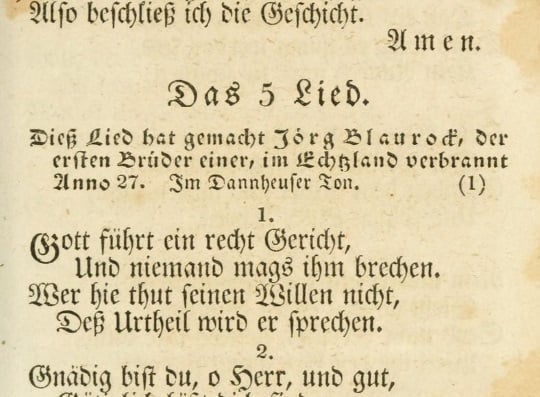
Andre´ Rottgeri, Eva Sattlegger, my son Nic, and I were at Oberhaus when the director of the museum, Dr. Stefanie Buchhold, told us they had rediscovered information about where the Ausbund hymns may have been composed. She asked Eva to take us up to the “Preacher’s Cell.”
And so, Nic, Andre, and I followed Eva as she took us up the winding wooden stairwell, the well worn boards creaked with each step, to the third floor to the Preacher’s Cell room in the clocktower. As I scanned around the room: The cell was roughly 30 feet by 30 feet square. In the room was a collection of stored books and few shelves of old documents and records. Almost instantly our eyes noticed the etching on the walls. Inscriptions were markings of a charcoal type of text writings and inscriptions. One of the markings was a music stanza with a date that could be viewed as 1535 or maybe 1565.

The writings on the wall appear to be Latin and German, it was hard to decipher because the walls had been plastered over, painted layers and over time there was peeling of the paint and plaster. To be able to investigate what is written on the walls this is going to take detailed restoration work. We captured a few images to be able look at this closer at a later date. The more we observed and looked at the walls, the more we felt like some of the Anabaptists may have been held captive in this third floor Preacher’s Cell of the tower. Perhaps, some of the Anabaptists were held captive in the castle dungeon and others in the Preacher’s Cell.

When I arrived back home in Florida, I called Aaron Petersheim with the Pequea Bruderschaft Library, Aaron also works with the Ausbund committee for the reprints and the corrections in text for the Ausbund Hymnal. When I shared with Aaron what we discovered in Passau, he was excited. Aaron and others members of the Bruderschaft invited me to give a presentation to the Pequea Bruderschaft Library meeting that was held in May. That evening I presented my findings to a group of 40 Amish men and women historians, printed out some papers to share with the group, shared my story of the journey to Passau. There was an excitement among the group about the information and connection to Passau. Finding this information about the Preacher’s cell, created more questions than answers.
What is next? We will be doing more research about the castle and Ausbund history, it would be great to restore the walls in Preacher’s Cell, continue documenting this story, and building bridges between American and Germany to learn more about our heritage and the beginnings of the oldest continuous usage song book in the world, known as the Ausbund Hymn book.

In August, Nic and I made a trip to Holmes County Ohio and Goshen Indiana to meet with Ausbund historians. Several of the highlights of this trip was to meet with Anabaptist historian Leroy Beachy, see first hand the detailed collection of his Ausbund collection at the Amish & Mennonite Heritage Center in Millersburg, Ohio and to hear how he collected these documents by traveling to Europe 22 times. Our next stop was to visit the Mennonite Historical Library of Goshen College, Goshen, Indiana where the oldest known Ausbund is housed at and to visit with Joe Springer, Curator of the Historical Library. During our stay there, we photographed the 1564 Ausbund, looked at old documents and listened to the informal lecture with Joe Springer.
Since the 2018 journey to Passau, Germany, what began as a visit to satisfy my curiosity, revisit my childhood memories has now become an obsession to learn more and become a student on the history of the Ausbund. It is an honor to learn from many who have researched, written and collected the documents on this unique hymn book that has defined the Anabaptists since the inception of this movement.

The oldest known Ausbund, a 1564 edition, restored by Jeffrey S. Peachey. Mennonite Historical Library, Goshen College, Goshen, IN.
Is there a future for the Ausbund? Of course, the Ausbund has been a very important document for the Anabaptists, Mennonites, Hutterites and Amish since the 1500’s. In today’s Amish circles, the Ausbund is the “Holy Grail”, the songs that bind, hymns that define the worship practices and stories that will continue to be shared generation after generation.
It would be our goal to have you travel to Passau, Germany and visit the Veste Oberhaus castle, take a tour of the museum and explore the dungeon along with tower with the preacher’s cell. Exploring an ancient community, the castle and to experience Oberhaus. If you care deeply about the Ausbund music and history, this would be an important journey.
The 1834 restored Ausbund from Raymond Smoker has traveled with me to Passau, Germany, been viewed by historians in Germany and was presented to cousins and kin of Raymond Smoker. Who knows where else this 1834 Ausbund book will travel in the next few years.
God bless, thank you for going on this journey through my childhood experiences, to Germany and back home to Lancaster, Pennsylvania.
Post Script
Earlier this year, my Dad Elmer Stoltzfus found out he had bone cancer and his health declined over the last few months. A few days after his 90th birthday, he had a bad fall and became bed-ridden. His health began to decline rapidly. I called him that following Monday, and he requested that I read and sing a verse from the Lob Lied (Love Song) from the Ausbund. In a slow cadence, I sung the first verse to him in German:
O Gott Vater, wir loben dich,
Und deine Güte preisen
Die du, o Herr, so gnädiglich,
Un uns neu hast beweisen,
Und hast uns Herr zusammen g’führt,
Uns zu ermahnen durch dein Wort,
Gib uns Genad zu diesem.
Oh God Father, we praise thee,
And they kindness glorify
Which thou oh Lord so mercifully
To us anew hast shown
And hast us Lord together led
Us to admonish through they word
Give us grace to this.
This was the last time I spoke with my Dad; he passed away the next day.
From early memories sitting beside Dad as a little boy, watching him lead the Ausbund hymns in church, to a final eulogy with words of a love song, these old German hymns have come full circle in my life.
With respect and love I will endeavor to carry on his legacy, his stories, and heritage.


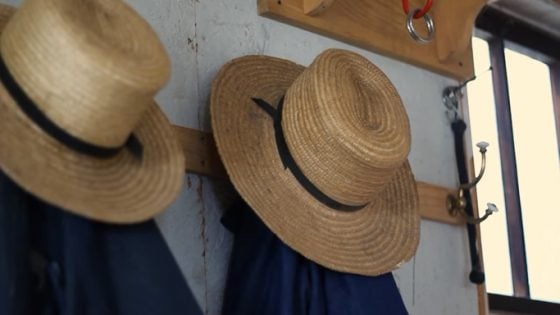
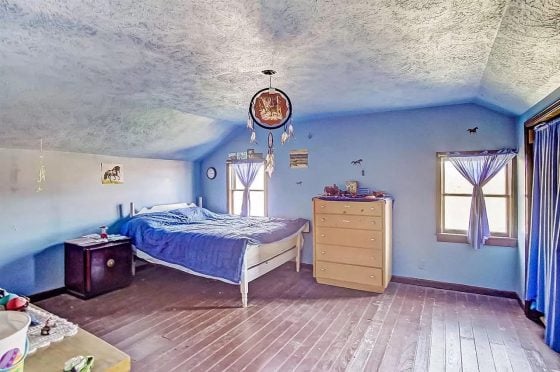
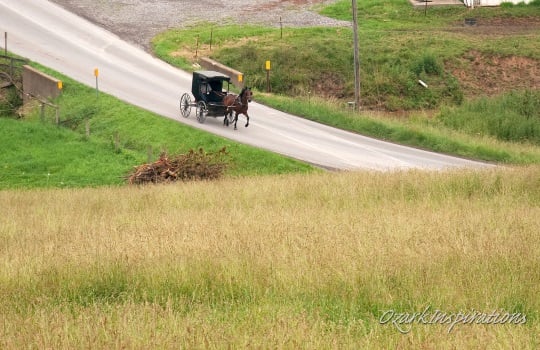
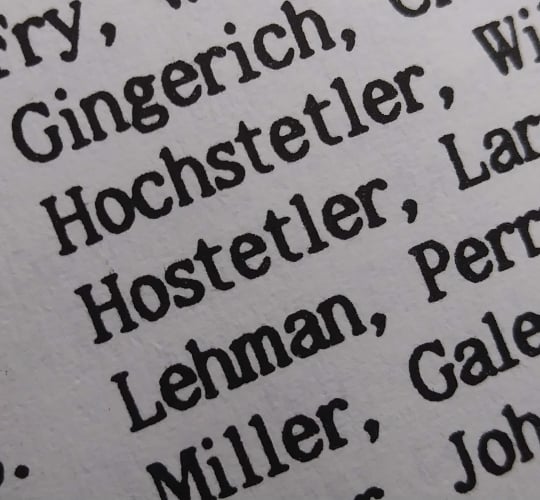
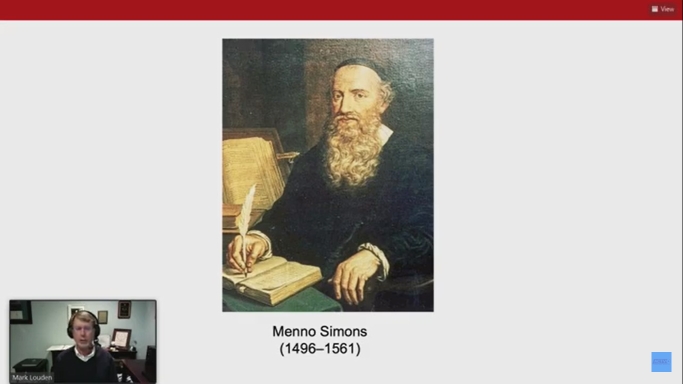
Bonjour,
Votre histoire est émouvante……l’héritage, les valeurs, la tradition, sont des choses très importantes pour transmettre nos racines.
Dans cette société où l’on veut tout diluer, faire un peuple global sans culture, sans religion, métissé pour gommer l’identité, tout est fait pour que l’individu en tant que tel ne soit plus. Mais chaque homme porte en lui une graine des générations qui l’on précédé et qui ne demande qu’a germé. Peut-être ferez-vous de même un jour avec vos enfants, vous demanderez à ce que l’on vous lise l’Ausbund qui est le point de départ et la finalité. Que Dieu vous bénisse et vous aide dans vôtre mission.
Sylvie